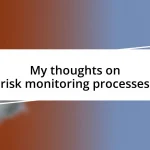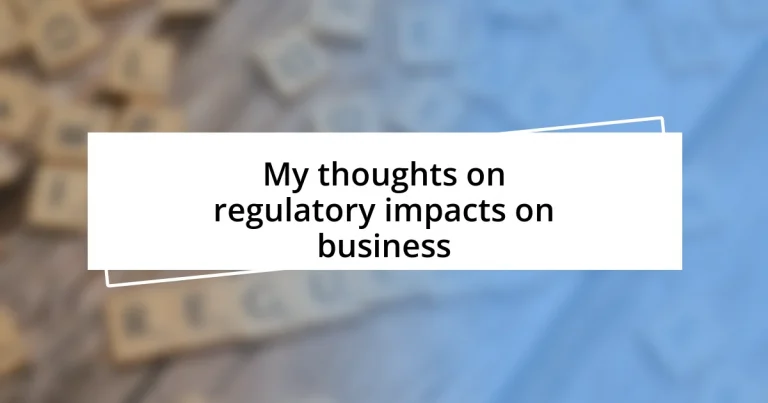Key takeaways:
- Regulations can be transformed from obstacles into opportunities, fostering innovation and customer trust, as demonstrated through adherence to environmental and data privacy standards.
- A proactive compliance strategy, which includes regular training and communication, can alleviate the pressure of regulatory compliance and contribute to a business’s growth and integrity.
- Future trends in regulation focus on digital technologies and sustainability, encouraging a collaborative approach between businesses and regulators for mutual benefit.
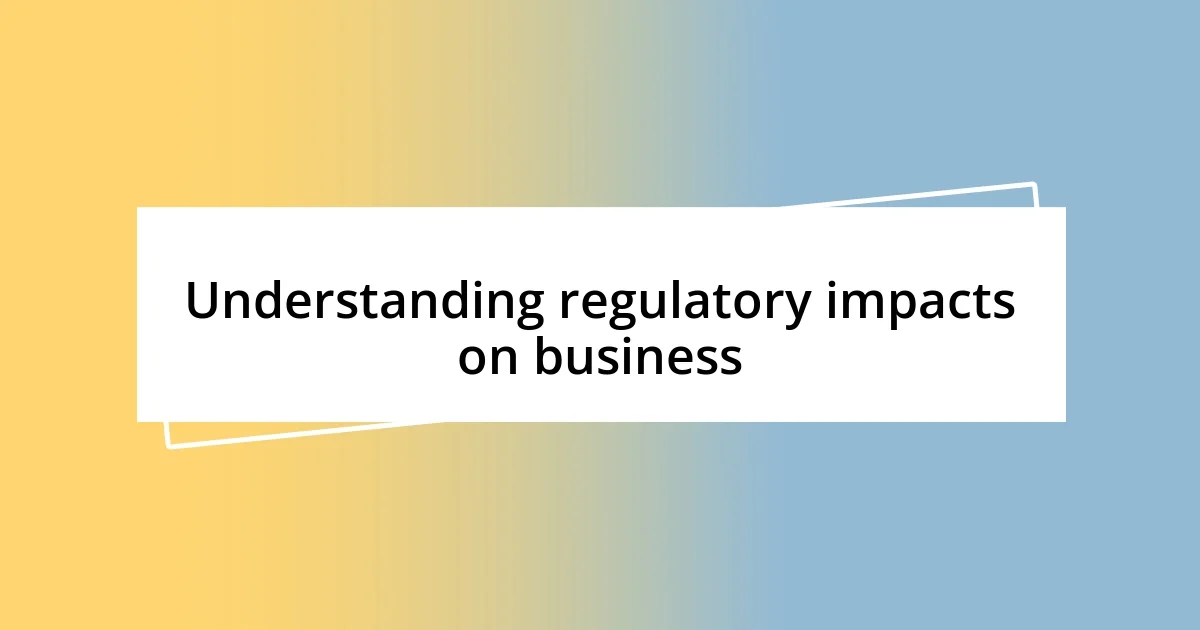
Understanding regulatory impacts on business
Regulatory impacts on business can often feel overwhelming, don’t you think? I remember when a new set of compliance rules rolled out in my city, and my small business had to scramble to adapt. It was a stressful time, but it taught me the importance of staying informed and agile; I realized that understanding regulations can actually be a strategic advantage.
Many business owners tend to view regulations as mere obstacles, but my experience has shown they can also serve as guidelines that foster innovation and growth. In one instance, adhering to environmental standards not only helped us maintain compliance but also opened doors to new clientele that valued sustainability. Isn’t it fascinating how these regulations can sometimes lead to unexpected opportunities?
Moreover, the emotional weight of knowing that non-compliance could lead to hefty fines or legal trouble is significant. I often found myself in deep thought about the balance between risk and reward. How do you manage that pressure? For me, the key was building a robust compliance strategy that transformed regulatory obligations from a burden into a structured way to ensure the longevity of my business.
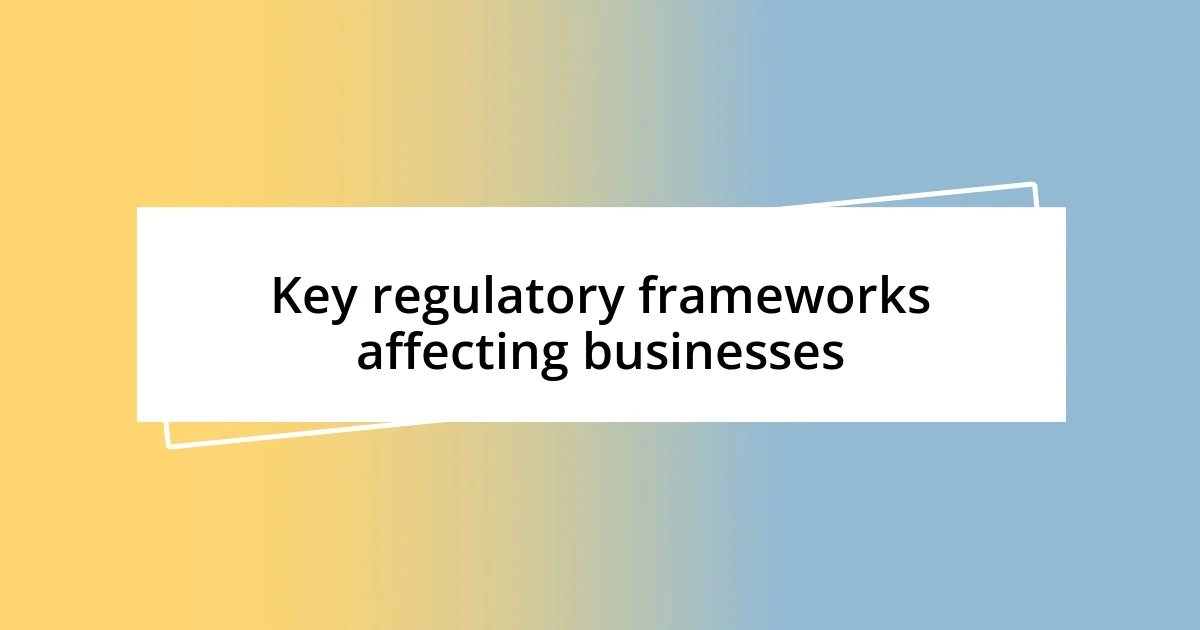
Key regulatory frameworks affecting businesses
Key regulations shape the landscape for businesses in various sectors. I’ve seen firsthand how the General Data Protection Regulation (GDPR) has compelled companies to rethink their data handling practices. This stringent framework not only impacts large corporations but also small startups like mine, making privacy a central theme in our operations. Adopting these practices was daunting at first; however, it became a valuable learning experience that enhanced our customers’ trust.
On the other hand, environmental regulations like the Clean Air Act have led many businesses to innovate and implement greener technologies. As someone who runs a local café, I remember how mandatory recycling programs shifted our waste management approach entirely. Initially, it felt like just another compliance tick-box, but soon it transformed our brand image, attracting eco-conscious customers who appreciated our efforts and ultimately increased our sales. Isn’t it remarkable how these regulations can turn into a business opportunity when viewed from a different perspective?
Another significant regulatory framework is the Sarbanes-Oxley Act for financial transparency, which has been especially influential in the corporate sector. My previous role in corporate finance had me collaborating with compliance teams, and I grasped just how crucial these regulations are in preventing fraudulent activities. While they require substantial resources to implement correctly, I’ve seen organizations flourish by prioritizing ethical practices that adhere to these frameworks. There’s a sense of pride in knowing you’re contributing to a fair business environment.
| Regulation | Impact on Businesses |
|---|---|
| GDPR | Redefines data privacy practices, requiring businesses to gain explicit consent from customers. |
| Clean Air Act | Encourages businesses to adopt sustainable practices, potentially leading to a competitive edge. |
| Sarbanes-Oxley Act | Promotes financial transparency, often enhancing integrity and attracting investors. |
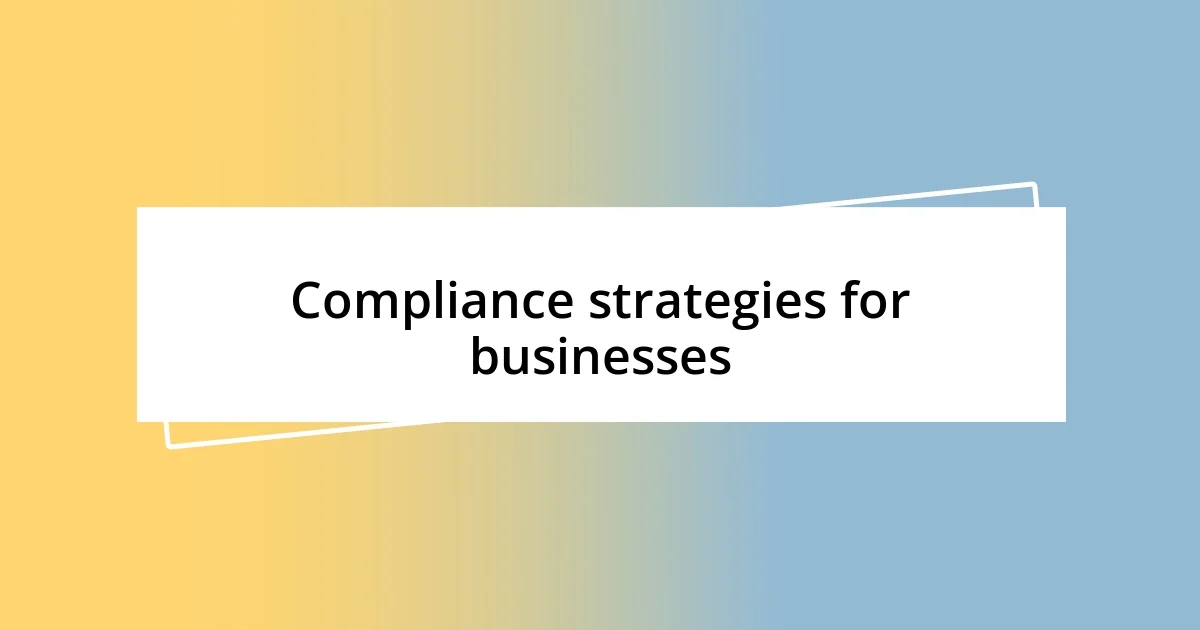
Compliance strategies for businesses
When it comes to compliance strategies, I’ve found that a proactive approach pays off significantly. For example, at my café, we instituted regular training sessions for staff on compliance matters. This not only ensured adherence to health regulations but also fostered a culture of accountability among employees. I remember feeling relieved when a surprise health inspection went smoothly—our preparation really made a difference.
To create an effective compliance strategy, consider the following key practices:
- Regular Training: Schedule periodic workshops to keep the team updated on changing regulations.
- Document Everything: Use a compliance checklist to record each step in your processes for accountability and reference.
- Designate a Compliance Officer: Having someone in charge streamlines the compliance effort and ensures there’s a clear point of contact.
- Stay Updated on Regulations: Subscribe to industry newsletters or platforms that provide updates on regulatory changes.
- Encourage Open Dialogue: Create a safe space for employees to voice concerns and ask questions regarding compliance.
These practices have personally transformed how I view regulations—from a source of anxiety to a fundamental part of my business’s integrity and growth.
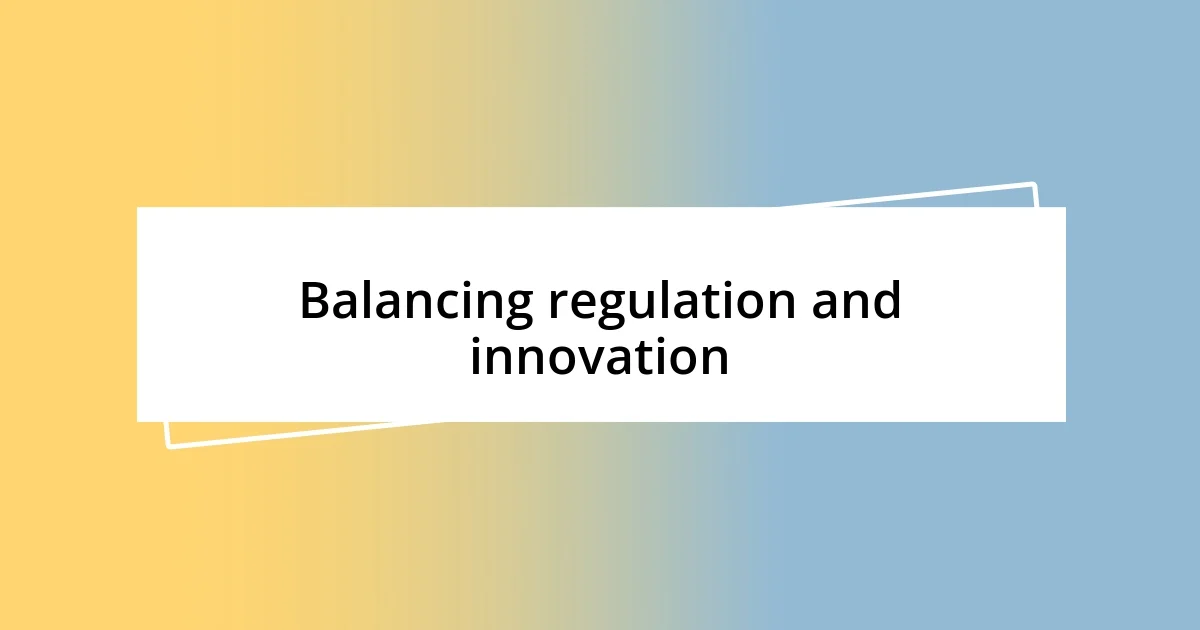
Balancing regulation and innovation
Navigating the delicate balance between regulation and innovation can be quite a challenge. I often find myself pondering the question: how can businesses remain creative while still adhering to regulatory requirements? For instance, when I was developing a new menu for my café, I had to ensure that all ingredients met health regulations. Surprisingly, this actually pushed me to explore local and organic options that I might not have considered otherwise. It’s fascinating to see how restrictions can sometimes ignite fresh ideas.
At times, I have felt the weight of regulation pressing down, making it seem like creativity gets stifled. However, I’ve learned that embracing these challenges fuels innovation. Take the Sustainable Development Goals; when I started considering them in my business model, it didn’t just improve compliance—it reinvigorated my passion for creating a welcoming space. By using eco-friendly products, I’ve not only met regulatory standards, but I’ve also attracted a loyal clientele that shares my values. Isn’t it interesting how we can turn compliance hurdles into stepping stones for innovation?
Ultimately, I believe that finding this balance requires a mindset shift. Instead of viewing regulations as constraints, I see them as opportunities for growth. When the local government introduced stricter health codes, instead of feeling overwhelmed, I started collaborating with suppliers to source better ingredients and improve our processes. This not only ensured compliance but also enriched our offerings. Have you ever considered how following the rules can lead to extraordinary outcomes?
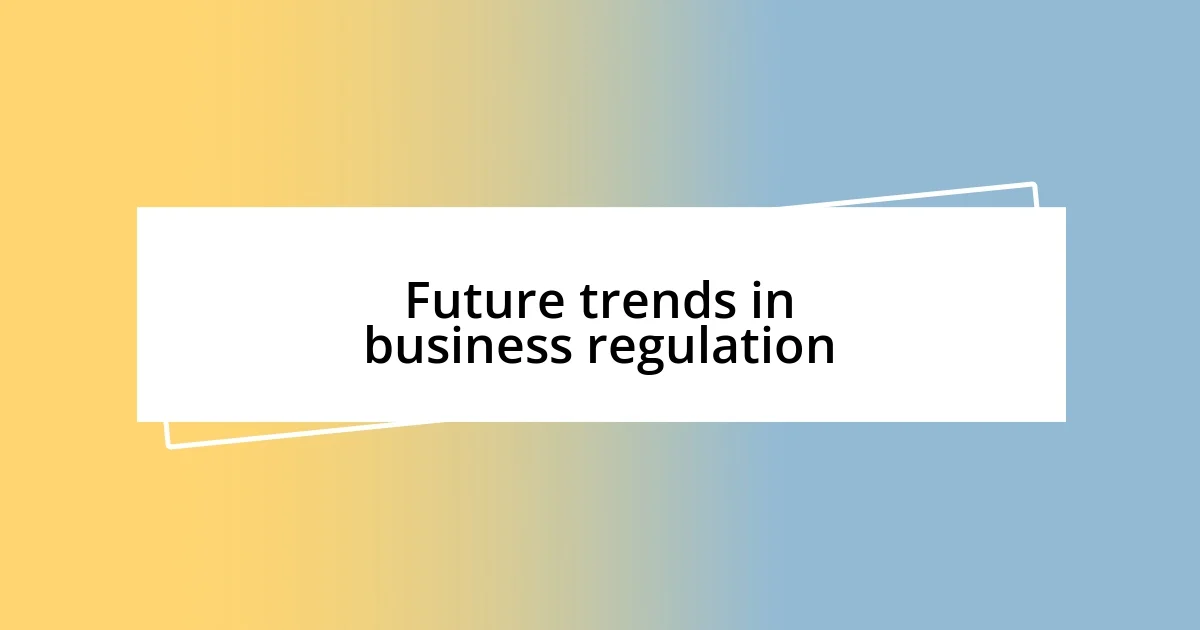
Future trends in business regulation
As I look ahead, I realize the trend of digital regulation is really gaining momentum. Technologies like AI and blockchain are being integrated into regulatory frameworks. I remember a recent meeting where we discussed how these technologies can streamline compliance reporting. It’s exciting to think about how automation might reduce the burden on businesses, but it does make me wonder; will we have to keep up with rapid changes in tech alongside evolving regulations?
Sustainability is another powerful trend that’s shaping future regulations. When I first started exploring eco-friendly practices at my café, I thought it was just about making a good impression. But now, I see it’s becoming essential for compliance. Regulations that promote sustainability not only encourage businesses to adopt greener methods but also resonate with customers who are increasingly concerned about the planet. I can’t help but feel that this shift is turning compliance into a way to connect with our community. Have you felt that shift too?
Moreover, I foresee a rise in collaborative efforts between regulators and businesses. I recall reaching out to local authorities when I needed clarification on a new permit process. That interaction not only built trust but also opened a dialogue about practical solutions tailored to local businesses. Engaging regulators as partners can alleviate misunderstandings and foster a shared vision, making compliance not just a requirement but a community effort. Isn’t it inspiring to think about what can happen when we combine our efforts with those who establish the rules?
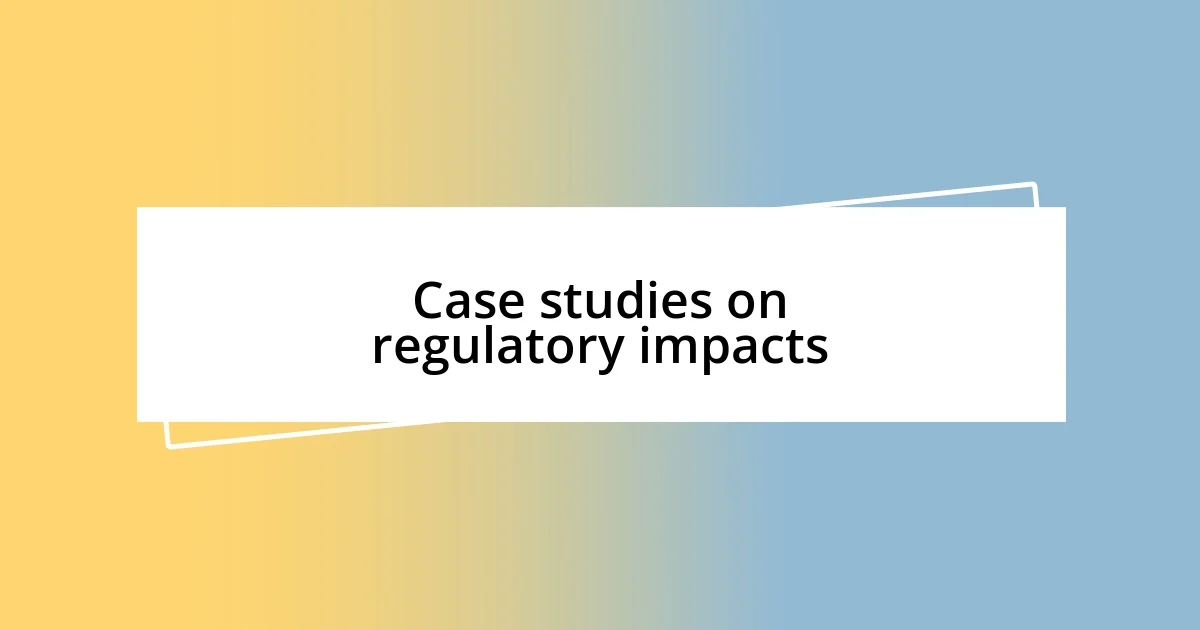
Case studies on regulatory impacts
Whenever I think about the impacts of regulation, I can’t help but recall the experience of a friend who runs a small manufacturing business. When new environmental regulations came into play, he initially panicked, fearing his operations would be upended. Instead, he decided to invest in cleaner technologies. This shift not only allowed him to comply with the new rules but also led to significant cost savings in the long run. Have you ever experienced a similar transformation in your business, where regulations prompted a change for the better?
Another memorable instance I encountered was during a workshop focused on compliance training. The speaker shared a case study about a restaurant affected by health regulations, highlighting a particular establishment’s journey. Initially overwhelmed, the owners chose to create a more transparent kitchen to engage diners. This move not only addressed compliance issues but also revitalized their brand image. Isn’t it remarkable how challenges can lead to innovative marketing strategies?
Then there’s that story about the retail sector facing changes in data protection laws. A colleague of mine had to rethink her approach to customer data, as compliance became paramount. Instead of seeing this as a burden, she developed a more personalized shopping experience, which not only met regulatory standards but also enhanced customer satisfaction. Isn’t it powerful how viewing regulations through a lens of opportunity can catalyze progress?




